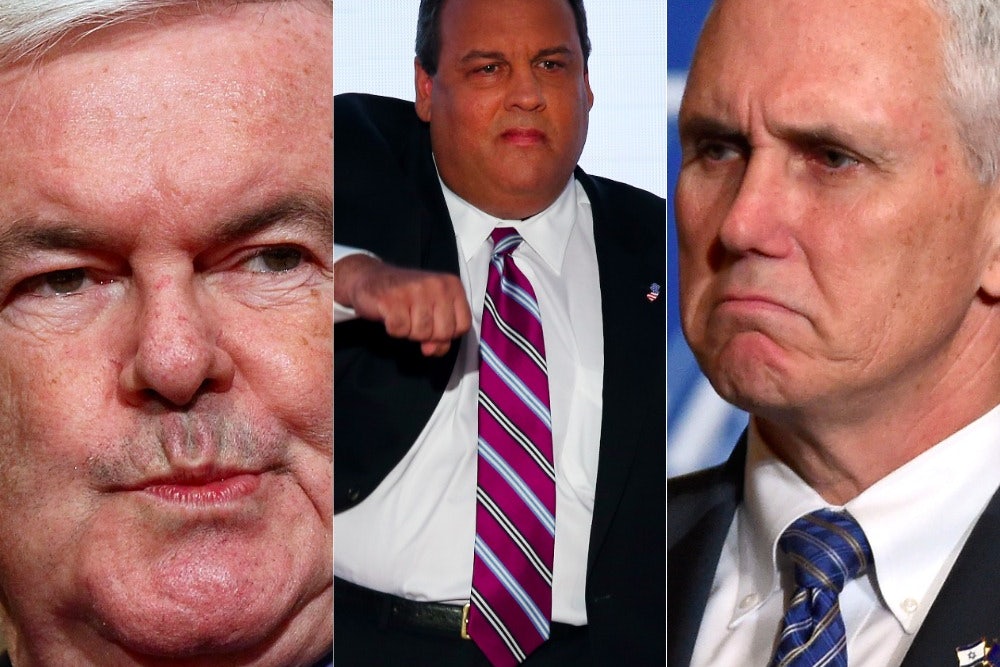There’s no such thing as a perfect running mate, but Donald Trump’s options are all bad. Normally, presidential candidates must choose among potential vice presidents who offer different virtues: regional variety versus governing experience; governing experience versus charisma; charisma versus national-security credentials, and so on. Trump is instead evaluating candidates who offer different liabilities, and must choose the one who carries the least risk, because the only kinds of politicians who’d agree to run with him are either profoundly damaged or second-rate.
Trump’s list of frontrunners hasn’t changed much in the past couple weeks, despite brief intrusions by a handful of diversionary options who quickly withdrew from contention or struggled in the limelight. The best reporting out of Trumpland suggests he will ultimately give the nod to either New Jersey Governor Chris Christie, Indiana Governor Mike Pence, or former House Speaker Newt Gingrich.
Were Trump not an erratic and indefensible candidate, Pence would win the contest in a walk. Trump’s bigotry and logorrhea problems are compounded by the fact that grassroots Republicans worry about his commitment to conservative ideas, and his ability to govern with those ideas as his lodestar. Trump has no experience in government, has changing or heterodox views on all kinds of issues, and does a laughably poor job feigning religiosity. Pence is an evangelical. Before he became a governor, he was a Tea Party forerunner in Congress. And he’s compensated for failing conservative purity tests as governor (by expanding Medicaid, for starters) by gaining executive experience.
Trump’s difficulties don’t stem from the kind of demoralization that afflicted the Republican Party at the end of George W. Bush’s presidency. He is not beset by Bush’s record of failure the way John McCain was, and is thus not subject to the same logic that led McCain to select Sarah Palin as his running mate. He doesn’t need to make a distracting splash. He’s doing badly because he offends and scares a lot of people, including people in his own party. It’s plausible that some of these people would give Trump a second look if he picked a trusted, steady-handed running mate. That may be his only shot at winning, and if so, the case for Pence would seem unimpeachable.
But Pence isn’t known for being particularly silver-tongued or quick-footed. As National Review editor Rich Lowry observed on Monday, “Trump’s running mate will have to be extremely deft at explaining away and deflecting Trump controversies. There is no reason to believe that Pence will be good at this, and I’m guessing he won’t be.”
Pence could calm Republican nerves, unite the party grassroots, and then wander on television or a debate stage and have an “oops” moment, unable to defend his new boss.
Christie and Gingrich are better talkers than Pence. But they offer Trump less protection in every other realm.
The vetting process has no doubt uncovered plenty of unflattering things about both men (indeed, this is one of Pence’s great advantages over them). Christie has more governing experience than Pence. But conservatives don’t trust him, and the people of New Jersey don’t like him. And he amplifies some of the temperamental concerns Republicans have with Trump.
So does Gingrich. Some conservatives like Newt well, or at least they trust his ideological instincts. But he is known to be erratic, and he, like Trump, was once a philanderer, and whatever governing or executive opportunities Gingrich had after leaving Congress nearly 20 years ago he passed up in favor of scam peddling, lobbying, Fox News contributing, and pioneering racist anti-Obama dog whistles. He is Democrats’ dream pick.
If Trump picks either Gingrich or Christie, it would serve as a kind of mercy for Pence. They stand to lose the least from accepting the vice-presidential nomination because, as early and eager Trump endorsers, they’ve already humiliated themselves.
It isn’t at all clear that sober concerns like these are guiding Trump’s thinking. Gingrich and Christie may benefit from the fact that they are (for the most part) shameless Trump yes-men, and Trump appreciates the flattery. He doesn’t want to negotiate with the conservative movement; he wants the movement to bend to him.
But rational analysis may not help Trump much anyhow. Nobody who would be a clear asset to his campaign is willing to join it, and none of his short-listers is clearly worse than the others.
